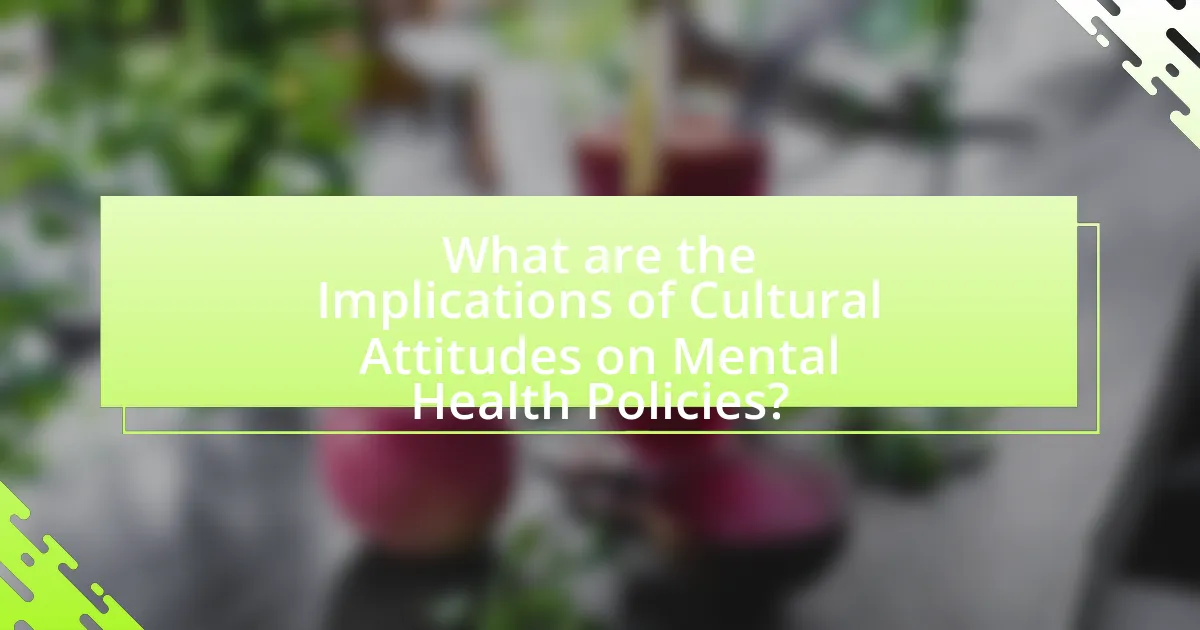Cultural attitudes toward mental health encompass the beliefs, perceptions, and behaviors that societies hold regarding mental health issues and treatment. These attitudes significantly influence help-seeking behaviors, stigma, and the understanding of mental health within communities. The article explores how cultural contexts, historical backgrounds, and religious beliefs shape perceptions of mental health, affecting treatment approaches and the willingness to seek help. It highlights the variations in mental health perceptions across cultures, the impact of stigma, and the importance of culturally competent care in improving mental health outcomes. Additionally, it discusses the implications of cultural attitudes on mental health policies and best practices for promoting mental health awareness in diverse communities.

What are Cultural Attitudes Toward Mental Health?
Cultural attitudes toward mental health refer to the beliefs, perceptions, and behaviors that different societies hold regarding mental health issues and treatment. These attitudes can significantly influence how individuals seek help, the stigma associated with mental illness, and the overall understanding of mental health within a community. For instance, in many Western cultures, there is a growing acceptance of mental health as a legitimate health concern, leading to increased advocacy and resources for mental health services. Conversely, in some Eastern cultures, mental health issues may be viewed through a lens of shame or as a sign of personal weakness, resulting in reluctance to seek help. Research indicates that stigma can deter individuals from accessing mental health care, with a study published in the “Journal of Mental Health” highlighting that cultural beliefs directly impact treatment-seeking behaviors and the effectiveness of mental health interventions.
How do cultural attitudes shape perceptions of mental health?
Cultural attitudes significantly shape perceptions of mental health by influencing how individuals understand, interpret, and respond to mental health issues. For instance, in collectivist cultures, mental health may be viewed through the lens of community and family, leading to stigma around seeking help, as individuals may fear bringing shame to their families. Conversely, in individualistic cultures, mental health is often seen as a personal responsibility, which can encourage individuals to seek treatment but may also lead to feelings of isolation if they struggle. Research indicates that cultural beliefs about mental illness can affect the willingness to seek help; for example, a study published in the “Journal of Cross-Cultural Psychology” by Kirmayer et al. (2001) found that cultural context plays a crucial role in shaping attitudes toward mental health services, with some cultures prioritizing traditional healing practices over Western medical approaches.
What factors influence cultural attitudes toward mental health?
Cultural attitudes toward mental health are influenced by factors such as historical context, religious beliefs, social norms, and access to education. Historical context shapes perceptions through past events and societal changes, while religious beliefs can dictate views on mental illness, often framing it as a moral or spiritual issue. Social norms, including stigma and discrimination, affect how mental health is discussed and treated within communities. Access to education plays a critical role, as higher levels of education often correlate with more progressive attitudes toward mental health, promoting understanding and reducing stigma. These factors collectively shape how different cultures perceive and respond to mental health issues.
How do historical contexts affect these attitudes?
Historical contexts significantly shape cultural attitudes toward mental health by influencing societal norms, beliefs, and practices. For instance, during the 19th century, the rise of the asylum system in Europe and North America reflected a prevailing view that mental illness was a moral failing, leading to stigmatization and isolation of individuals with mental health issues. This historical perspective has persisted in various forms, affecting contemporary attitudes that often still associate mental illness with weakness or personal failure. Additionally, events such as wars, economic crises, and social movements have historically altered public perceptions, as seen in the post-World War II era when increased awareness of psychological trauma led to a gradual shift toward understanding mental health as a legitimate medical concern. These historical shifts illustrate how societal attitudes evolve in response to changing contexts, ultimately impacting the treatment and perception of mental health across different cultures.
Why is it important to study cultural attitudes toward mental health?
Studying cultural attitudes toward mental health is crucial because these attitudes significantly influence individuals’ willingness to seek help and adhere to treatment. Research indicates that stigma surrounding mental health varies across cultures, affecting access to care; for instance, a study published in the “Journal of Affective Disorders” found that individuals from cultures with high stigma are less likely to pursue mental health services. Understanding these cultural perspectives allows for the development of tailored interventions that respect cultural beliefs, ultimately improving mental health outcomes and promoting well-being within diverse populations.
What impact do these attitudes have on mental health treatment?
Cultural attitudes significantly impact mental health treatment by influencing patients’ willingness to seek help and adhere to treatment plans. For instance, in cultures where mental illness is stigmatized, individuals may avoid seeking care due to fear of judgment, leading to untreated conditions and worsening symptoms. Research indicates that stigma can reduce the likelihood of individuals accessing mental health services by up to 50%, as seen in a study published in the Journal of Mental Health, which highlights the correlation between cultural perceptions and treatment engagement. Additionally, positive cultural attitudes can enhance treatment outcomes by fostering supportive environments that encourage open discussions about mental health, ultimately leading to improved patient compliance and recovery rates.
How do cultural attitudes affect stigma surrounding mental health?
Cultural attitudes significantly influence the stigma surrounding mental health by shaping perceptions and beliefs about mental illness. In cultures where mental health issues are viewed as a sign of weakness or moral failing, individuals may experience heightened stigma, leading to social isolation and reluctance to seek help. For instance, a study published in the “Journal of Affective Disorders” found that in collectivist societies, the fear of bringing shame to one’s family can exacerbate stigma, resulting in lower rates of treatment-seeking behavior. Conversely, cultures that promote open discussions about mental health and emphasize psychological well-being tend to have lower stigma levels, facilitating access to care and support.

How do Different Cultures Perceive Mental Health?
Different cultures perceive mental health through varied lenses shaped by historical, social, and religious contexts. For instance, in Western cultures, mental health is often viewed through a medical model, emphasizing diagnosis and treatment, as evidenced by the prevalence of psychological therapies and medications. In contrast, many Eastern cultures may interpret mental health issues as a result of spiritual imbalance or familial discord, leading to reliance on community support and traditional healing practices. Research by the World Health Organization indicates that cultural beliefs significantly influence how individuals understand and respond to mental health challenges, highlighting the importance of culturally sensitive approaches in mental health care.
What are the variations in mental health perceptions across cultures?
Variations in mental health perceptions across cultures are significant, influenced by factors such as societal norms, stigma, and access to care. For instance, in Western cultures, mental health is often viewed through a medical lens, emphasizing diagnosis and treatment, while in many Asian cultures, mental health issues may be seen as a source of shame, leading to reluctance in seeking help. Research by the World Health Organization indicates that cultural beliefs shape how individuals interpret mental health symptoms and their willingness to engage with mental health services. In African cultures, communal support systems often play a crucial role in addressing mental health, contrasting with the individualistic approaches prevalent in Western societies. These cultural differences highlight the need for culturally sensitive mental health interventions that respect and integrate local beliefs and practices.
How do Western cultures view mental health compared to Eastern cultures?
Western cultures generally view mental health as a personal issue that emphasizes individualism and professional treatment, while Eastern cultures often perceive it as a communal concern linked to social harmony and family involvement. In Western societies, mental health is frequently addressed through clinical interventions, with a focus on diagnosis and therapy, as evidenced by the prevalence of mental health professionals and institutions. In contrast, Eastern cultures may prioritize holistic approaches, integrating traditional practices and community support, reflecting a belief that mental well-being is interconnected with societal relationships. This distinction is supported by studies indicating that Western countries have higher rates of mental health service utilization, while Eastern cultures may rely more on familial and social networks for support.
What role does religion play in shaping mental health attitudes in various cultures?
Religion significantly influences mental health attitudes across various cultures by providing frameworks for understanding mental illness, shaping stigma, and guiding coping mechanisms. In many cultures, religious beliefs can dictate whether mental health issues are viewed as medical conditions or moral failings. For instance, in some Christian communities, mental illness may be interpreted as a test of faith or a spiritual battle, which can lead to stigma and reluctance to seek professional help. Conversely, in cultures where mental health is viewed through a spiritual lens, such as in certain Indigenous traditions, healing practices may incorporate spiritual rituals, promoting acceptance and community support for individuals facing mental health challenges. Research indicates that religious involvement often correlates with lower levels of depression and anxiety, as seen in a study published in the Journal of Religion and Health, which found that individuals with strong religious beliefs reported better mental health outcomes. Thus, religion plays a crucial role in shaping how mental health is perceived and addressed within different cultural contexts.
How do cultural beliefs influence mental health practices?
Cultural beliefs significantly influence mental health practices by shaping perceptions of mental illness and determining the methods of treatment. For instance, in collectivist cultures, mental health issues may be viewed as a family concern, leading to reliance on family support and traditional healing practices rather than professional mental health services. Research indicates that in many Asian cultures, stigma surrounding mental illness can prevent individuals from seeking help, as seen in a study published in the Journal of Mental Health, which found that cultural stigma was a major barrier to accessing mental health care in Asian populations (Kumar et al., 2020). Additionally, cultural beliefs can dictate the acceptance of alternative therapies, such as herbal medicine or spiritual healing, which may be preferred over conventional psychiatric treatments in certain communities. Thus, cultural beliefs play a crucial role in shaping both the understanding and the response to mental health issues.
What traditional practices exist in different cultures for addressing mental health issues?
Traditional practices for addressing mental health issues vary significantly across cultures. In Indigenous cultures, such as Native American tribes, healing ceremonies involving rituals, songs, and community support are common, emphasizing spiritual balance and connection to nature. In African cultures, practices like storytelling and communal gatherings serve as therapeutic outlets, fostering social cohesion and emotional expression. In Asian cultures, particularly in China, traditional Chinese medicine incorporates acupuncture and herbal remedies, alongside practices like Tai Chi and meditation, to promote mental well-being. These practices are rooted in historical contexts where mental health was often viewed through spiritual or communal lenses, highlighting the importance of cultural beliefs in shaping approaches to mental health care.
How do cultural attitudes affect the willingness to seek help?
Cultural attitudes significantly influence the willingness to seek help, as they shape perceptions of mental health and the stigma associated with it. For instance, in collectivist cultures, where community and family reputation are prioritized, individuals may avoid seeking help to prevent bringing shame to their families. Research by Wang et al. (2007) in the “Archives of General Psychiatry” indicates that cultural stigma can deter individuals from accessing mental health services, leading to underutilization of available resources. Conversely, cultures that promote open discussions about mental health and encourage help-seeking behaviors tend to have higher rates of individuals accessing support services. This demonstrates that cultural norms and values directly impact the likelihood of individuals seeking help for mental health issues.

What are the Implications of Cultural Attitudes on Mental Health Policies?
Cultural attitudes significantly influence mental health policies by shaping public perceptions, stigma, and the prioritization of mental health issues. For instance, in cultures where mental illness is stigmatized, individuals may avoid seeking help, leading to underfunded mental health services and inadequate policy responses. Research indicates that countries with more accepting cultural attitudes towards mental health, such as Sweden, tend to have comprehensive mental health policies and better access to care, as evidenced by the World Health Organization’s reports on mental health systems. Conversely, in cultures with strong stigma, like in some Asian countries, mental health issues may be viewed as personal failures, resulting in limited policy development and support systems. Thus, cultural attitudes directly impact the effectiveness and reach of mental health policies.
How do cultural attitudes inform mental health policy development?
Cultural attitudes significantly inform mental health policy development by shaping perceptions of mental illness and influencing the prioritization of mental health issues within a society. For instance, in cultures where mental health is stigmatized, policies may focus less on mental health services and more on punitive measures, as seen in some regions where mental illness is viewed as a moral failing. Conversely, cultures that promote mental well-being and view mental health as integral to overall health tend to develop comprehensive policies that include prevention, treatment, and community support systems. Research by the World Health Organization indicates that countries with positive cultural attitudes towards mental health, such as those in Scandinavia, often have lower rates of mental health stigma and more robust mental health policies, leading to better outcomes for individuals with mental health conditions.
What challenges arise when integrating cultural perspectives into mental health policies?
Integrating cultural perspectives into mental health policies presents challenges such as differing cultural beliefs about mental health, stigma associated with mental illness, and varying levels of access to care. These challenges arise because cultural beliefs can influence how individuals perceive mental health issues and their willingness to seek help. For instance, in some cultures, mental illness may be viewed as a personal weakness or a source of shame, leading to reluctance in utilizing mental health services. Additionally, systemic barriers, such as language differences and lack of culturally competent providers, can hinder effective policy implementation. Research indicates that culturally tailored interventions can improve mental health outcomes, yet the lack of resources and training for providers remains a significant obstacle.
How can policymakers address cultural stigma in mental health initiatives?
Policymakers can address cultural stigma in mental health initiatives by implementing community-based education programs that promote awareness and understanding of mental health issues. Research indicates that stigma is often rooted in misinformation and cultural beliefs; therefore, targeted educational campaigns can effectively challenge these misconceptions. For instance, a study published in the “Journal of Mental Health” by Corrigan et al. (2012) found that public education efforts significantly reduced stigma and improved attitudes toward mental health treatment. By collaborating with cultural leaders and utilizing culturally relevant messaging, policymakers can foster an environment that encourages open discussions about mental health, ultimately leading to increased acceptance and support for individuals seeking help.
What best practices can improve mental health outcomes across cultures?
Best practices that can improve mental health outcomes across cultures include culturally competent care, community engagement, and the integration of traditional healing practices. Culturally competent care ensures that mental health professionals understand and respect the cultural backgrounds of their clients, which has been shown to enhance treatment adherence and satisfaction (Sue et al., 2009). Community engagement fosters support networks and reduces stigma, as evidenced by programs that involve local leaders in mental health awareness initiatives, leading to increased help-seeking behaviors (Corrigan, 2004). Additionally, integrating traditional healing practices with modern mental health treatments can enhance effectiveness, as seen in studies where patients reported better outcomes when their cultural beliefs were acknowledged in their treatment plans (Kleinman, 1980).
How can cultural competence be integrated into mental health services?
Cultural competence can be integrated into mental health services by implementing training programs for mental health professionals that focus on understanding diverse cultural backgrounds and their impact on mental health perceptions. Research indicates that culturally competent care improves patient satisfaction and treatment outcomes, as evidenced by a study published in the American Journal of Psychiatry, which found that culturally tailored interventions significantly reduced symptoms in minority populations. Additionally, incorporating community input and feedback into service design ensures that mental health services are relevant and accessible to various cultural groups, further enhancing the effectiveness of care provided.
What strategies can be employed to promote mental health awareness in diverse communities?
To promote mental health awareness in diverse communities, targeted educational campaigns that respect cultural values and languages should be employed. These campaigns can include workshops, community events, and social media outreach tailored to specific cultural contexts, ensuring that the messaging resonates with the community’s beliefs and practices. Research indicates that culturally adapted interventions significantly improve engagement and understanding; for instance, a study published in the American Journal of Public Health found that culturally relevant mental health programs increased participation rates by 50% in minority populations. Additionally, collaboration with local leaders and organizations can enhance trust and credibility, facilitating open discussions about mental health issues.
